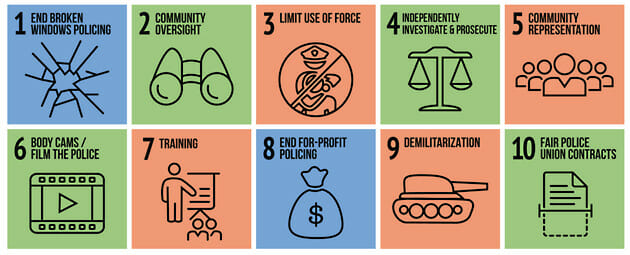Why BLM and the Campus "Rape Culture" Movement Are A Lot Alike
Both BLM and the campus rape culture movement have a starting point in real problems.
On campus, and even in a few police precincts, women complaining about sexual assault would get patted on the head and sent on their way, their charges going largely investigated. In part, oddly enough, I think the problem stems from the war on drugs -- for literally decades, campus police have helped to shelter their students from drug investigations and harassment from their local community police force. I know they did so at Princeton when I was there. So campus police forces really had a mission to keep their students out of jail and out of trouble. This is A-OK with me on drugs, but it obviously leads to terrible results when we get to sexual assault. So something needed to be done to have police forces, particularly ones on campus, take sexual assault charges seriously.
With police, officers have been sheltered from any real accountability for years. We give the police the ability to use force and other powers that ordinary citizens don't possess, but instead of giving them more scrutiny and accountability to offset these powers, we give them less. This has really been a bipartisan problem -- Conservatives tend to fetishize the police and want to assume by default that all police actions are justified. The Left is more willing to be skeptical of police behavior, but they refuse to take on any public sector union and police unions have generally locked in their contracts any number of accountability-avoidance mechanisms. So something needed to be done to bring accountability to police forces.
And with these quite justifiable and reasonable goals around which many of us could have coalesced into some sort of consensus, both protest efforts immediately overreached into crazy zones.
On campus, the reasonable demand for serious action in response to a sexual assault charge was abandoned in favor of the demand for immediate conviction without due process based on any sexual assault charge. Oddly mirroring the conservative attitude towards police, activists said that alleged victims had to always believed, and demanded that universities punish anyone accused of sexual transgressions. The result has become a toxic mess, and in some ways is a setback for justice, as activists have made it easier to get a rapist thrown out of school but perhaps harder to actually get thrown in jail.
With police, activists immediately eschewed the reasonable need for more police accountability and jumped to the contention that all police officers are racist and systematically abuse black citizens. Their focus seems to be on police shootings, though I find the pattern of petty police harassment (through the war on drugs and programs like New York's stop and frisk) to be more problematic. Just as in the campus rape debate, a reasonable need for more accountability and investigation of police shootings has morphed into a demand that police officers be treated as guilty by default in all shootings.
Each of these movements have made the problems more visible while simultaneously making these problems less likely to be solved.
I will add that I stick by my evaluation of BLM I wrote a while back. I actually sort of liked a lot of their proposed plan, but I wrote (see particularly part in bold):
There is much that progressive and conservative groups could learn from each other. Conservative groups (outside of anti-abortion folks) are loath to pursue the public demonstration and disruption tactics that can sometimes be helpful in getting one's issues on the public agenda. The flip side is that public disruption seems to be all BLM knows how to do. It can't seem to get beyond disruption, including the unfathomable recent threat to disrupt an upcoming marathon in the Twin Cities. It could learn a lot from Conservative and libertarian groups like ALEC, that focus on creating model legislation and local success stories that can be copied in other places. Many of the steps in BLM's plan cry out of model legislation and successful pilots/examples.
